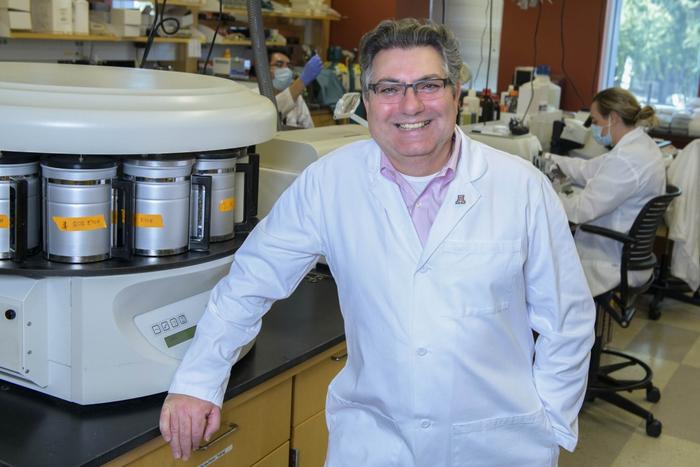The Juvenile Diabetes Research Foundation awarded researchers at the University of Arizona College of Medicine – Tucson a $2.7 million grant for clinical testing of a novel, oxygen-enabled, implantable pouch containing pancreatic cell clusters that produce insulin.

Credit: UArizona Health Sciences
The Juvenile Diabetes Research Foundation awarded researchers at the University of Arizona College of Medicine – Tucson a $2.7 million grant for clinical testing of a novel, oxygen-enabled, implantable pouch containing pancreatic cell clusters that produce insulin.
Type 1 diabetes is an autoimmune disease in which the body makes insufficient insulin, a hormone produced in the pancreas that regulates blood glucose levels. The disease is currently treated with supplemental insulin delivered by manual injection or through a subcutaneous insulin pump. Patients with Type 1 diabetes need to test their blood sugar levels and receive insulin multiple times a day to ensure their blood glucose stays within the recommended range.
The implantable pouch, developed by a team led by Klearchos Papas, PhD, professor of surgery, is a bioartificial pancreas containing groups of cells called islets that can produce insulin. The team hopes the implant will remove the need for people to test their blood-sugar levels or inject supplemental insulin. Clinical testing is expected to begin within three years.
“Our approach will eliminate big swings in blood sugar that can cause all kinds of problems. It controls blood-sugar levels so you don’t have to think about it.” Papas said.” “There are some similar encapsulation approaches being tested, but nothing really has worked. We believe we have the differentiating component that will make it work, so we’re very excited.”
The key difference with Papas’ device is the delivery of oxygen to the pouch in combination with highly specialized membranes. Oxygen encourages blood vessel growth within the pouch, improving the viability and function of the islet cells within. The membranes promote the growth of new blood vessels near or within the device to allow for improved nutrient exchange and a reduced foreign-body response, a common issue with implants.
The implant prototype uses islets from donors who may not be immunologically matched with the recipient, making it similar to an organ transplant but without the need for major surgery. Immune-suppressing drugs are required to prevent the immune system from attacking the donor cells.
Researchers in the field believe that lab-grown islets genetically modified to be compatible with a person’s immune system could be available in three to five years, removing the need for immunosuppression. Papas is hopeful clinical testing and validation of the implant is complete by the time lab-grown cells become available so that people with Type 1 diabetes can benefit from pancreas-like functionality without the potentially harmful effects of immunosuppression.




